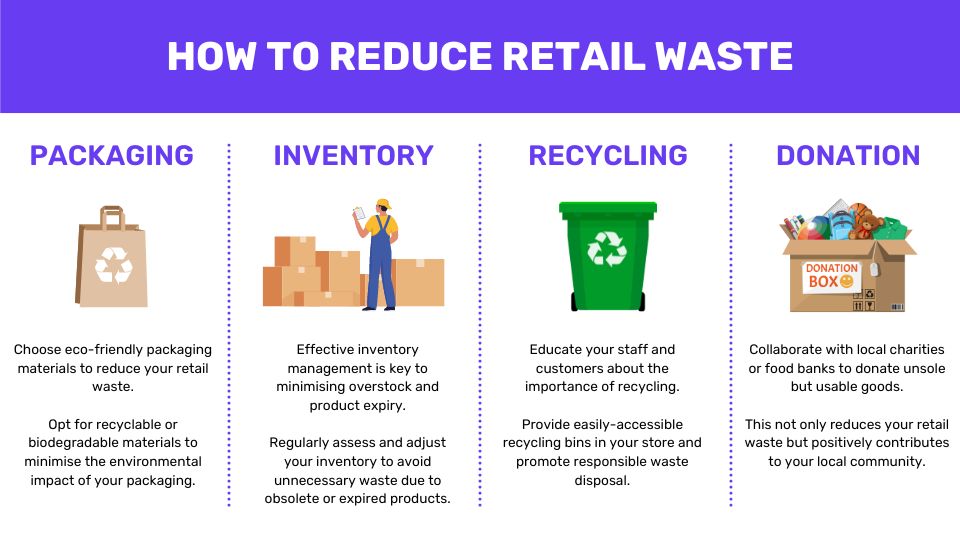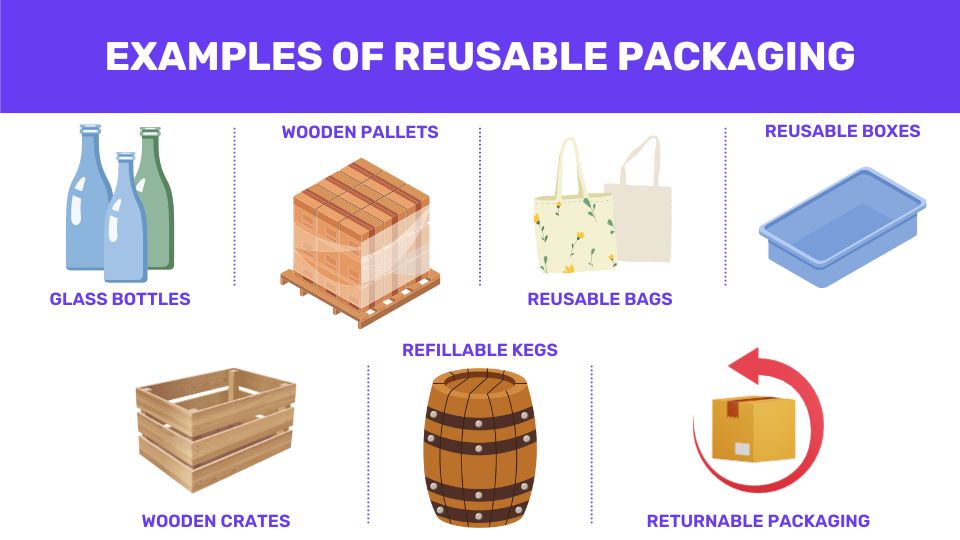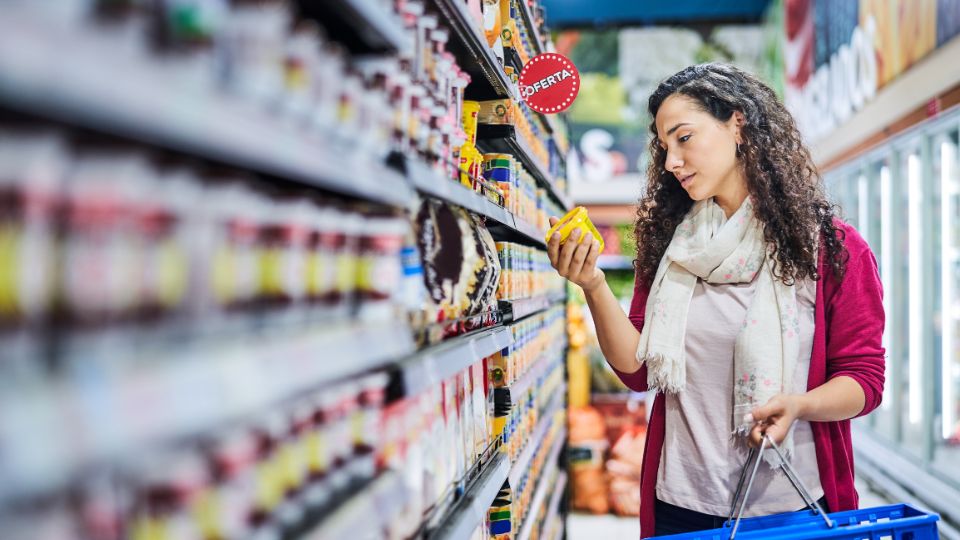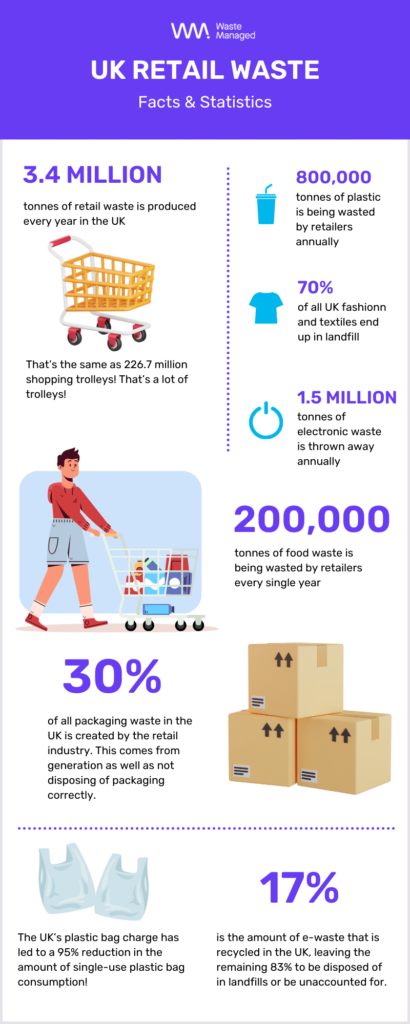
In the world of retail, where consumerism is on the rise, the issue of retail waste has gained significant attention among consumers.
Business owners need to be well-versed in the controversial topics of retail waste, from understanding what it is to comply with UK retail waste laws and regulations.
This guide will discuss the various aspects of retail waste management, including how to reduce retail waste and crucial information on UK shop waste for business owners.
Table of Contents:
- What is Retail Waste?
- How to Reduce Retail Waste
- Retail Waste Laws and Regulations in the UK
- The Future of Retail Waste Management
- UK Retail Waste Statistics
- Conclusion
What is Retail Waste?
Retail waste includes any discarded materials generated during the operation of a retail business.
This can include packaging materials, expired products, damaged goods, and other materials no longer deemed useful.
Understanding the nature of retail waste is the first step in developing effective waste management strategies.
How to Reduce Retail Waste

1. Implement Sustainable Packaging
In the ever-evolving landscape of retail, the choices made in packaging materials play a pivotal role in determining the environmental impact of a business.
As the public becomes increasingly environmentally conscious, consumers are scrutinising the sustainability practices of the brands they support.
Recyclable Materials
Opting for recyclable packaging materials is a fundamental strategy in mitigating the environmental impact of retail waste.
Recyclable materials include cardboard, paper, glass, and certain types of plastic.
These materials can go through the recycling process; so are collected, processed, and reused, reducing the overall demand for raw materials and cutting down on the amount of waste destined for landfills.
Did you know that recycling a single plastic bottle can conserve enough energy to light a 60W light bulb for up to 6 hours?
Make sure you’re doing the bit for the planet by only purchasing packaging that can be recycled – better yet, recycled packaging that can be recycled again!
Read more about how to recycle packaging peanuts in our dedicated blog!
Biodegradable Materials
Biodegradable packaging materials are designed to break down naturally over time, minimising the long-term impact on the environment.
These materials often include plant-based polymers, starch, and other organic compounds.
Choosing biodegradable packaging demonstrates a commitment to eco-friendly practices, especially in industries where traditional plastics have been prevalent.
Compostable Packaging
Compostable packaging takes sustainability a step further.
These materials break down into natural elements and enrich the soil, acting as a nutrient rather than contributing to pollution.
While compostable materials may require specific conditions for degradation, they offer a holistic solution to the end-of-life cycle of packaging.
Did you know that compostable packaging promotes biodiversity, capturing and destroying up to 99.9% of chemicals in contaminated air?
Are biodegradable and compostable packaging the same thing?
No. Biodegradable and compostable packaging is not the same thing.
Biodegradable packaging is designed to break down naturally over time, whereas compostable packaging is designed to be composted in soil, requiring specific conditions to be degraded.
Compostable packaging has been argued to be significantly more environmentally friendly than biodegradable packaging.
Reusable Packaging
An emerging trend in sustainable packaging is the adoption of reusable materials.
This involves designing packaging that can be easily cleaned and reused, either by the consumer or through a closed-loop system with the retailer.
While this approach requires more significant upfront investment, it significantly reduces the overall generation of packaging waste.
Examples of Reusable Packaging:
- Glass bottles
- Wooden or plastic pallets
- Reusable bags
- Reusable boxes
- Wooden crates
- Refillable kegs
- Returnable packaging programmes

The choice of packaging materials is a powerful tool in a retailer’s arsenal to combat the environmental impact of retail waste.
By adopting recyclable, biodegradable, compostable, or reusable materials and collaborating with like-minded suppliers, businesses can actively contribute to a more sustainable and responsible future.
This not only benefits the environment but also enhances brand reputation and consumer loyalty in an increasingly eco-aware market.
2. Inventory Management
In retail, having effective inventory management is essential for not only good business practice, but minimising your retail waste and reducing costs for the business.
From preventing overstock to reducing product expiry, effective inventory management plays a pivotal role in ensuring a sustainable and cost-effective business model.
Real-Time Inventory Tracking
Implementing real-time inventory tracking systems and technology is important for effective inventory tracking.
This technology allows retailers to monitor stock levels, track sales in real time, and receive alerts for low-stock items.
By having a clear understanding of inventory levels, businesses can avoid overordering, reducing the likelihood of surplus stock that may eventually contribute to retail waste.

Data Analytics for Demand Forecasting
Utilising data analytics tools enables retailers to forecast demand accurately.
By analysing historical sales data, market trends, and seasonality, businesses can make informed decisions about how much stock to order and when.
This proactive approach minimises the risk of overstocking and subsequently decreases the chances of products reaching their expiration dates before being sold.
Did you know that Johnson & Johnson (one of the biggest multi-national corporations, producing medical devices, pharmaceuticals, and consumer packaged goods) use demand forecasting to always ensure product availability regardless of season!
First-In, First-Out (FIFO) Method
Adopting the FIFO method is a simple yet effective strategy to prevent product expiry.
This method involves selling the oldest stock first, ensuring that products with earlier expiration dates are prioritised.
This practice not only minimises waste but also enhances product quality and customer satisfaction.
Supplier Collaboration and Just-in-Time (JIT) Inventory
Working closely with suppliers and adopting a Just-in-Time inventory approach helps businesses receive goods only as needed.
This reduces the need for extensive warehousing and lowers the risk of products becoming obsolete or expiring before being sold.
Effective inventory management is not just about keeping shelves stocked; it’s about adopting proactive strategies to minimise retail waste.
By embracing real-time tracking, data analytics, FIFO methods, supplier collaboration, and regular audits, retailers can strike a balance between meeting customer demand and minimising the environmental impact of surplus or expired products.
3. Encourage Recycling Practices
As businesses increasingly acknowledge their role in environmental sustainability, promoting recycling within retail operations becomes a crucial aspect of responsible waste management.
Educating both staff and customers about the importance of recycling and facilitating easy and accessible recycling options can significantly contribute to a more environmentally conscious retail environment.
Staff Training & Awareness
Implement regular training programmes for staff to raise awareness about the environmental impact of retail waste and the importance of recycling.
This can include information on the different types of materials, recycling procedures, and the overall goals of the recycling initiatives.
Encourage employees to actively participate in recycling efforts by recognising and rewarding sustainable practices.
This creates a sense of responsibility and commitment to environmental initiatives among the staff.
Find more information on what the different recycling symbols mean and share with your staff.
Easily-Accessible Recycling Bins
Position recycling bins prominently throughout the store, especially in high-traffic areas and near checkout points.
This makes it convenient for customers to dispose of recyclable materials without inconveniencing their shopping experience.
Implement a clear system of differentiated bins for various types of materials, such as paper, plastic, glass, clothing and metal.
Incentivising Responsible Waste Disposal
You can encourage your customers to recycle at your store with loyalty programmes.
You can offer discounts, exclusive deals, or points for those who participate in recycling at your store.
Recognise staff members who actively contribute to promoting recycling practices.
4. Donate Unsold Goods
In the pursuit of sustainable retail practices, working with local charities or food banks to donate unsold yet still usable goods is a great strategy.
This not only helps in reducing retail waste but also makes a meaningful contribution to community welfare.
Identifying Usable Goods
Implement a system for regular assessments of inventory to identify products that are approaching their expiration dates or are no longer viable for sale but are still safe for consumption.
Establish a clear quality standard for the goods due to be donated, ensuring that all items are meeting the safety and hygiene criteria set out by local health regulations.
Establishing Partnerships with Charities and Food Banks
Research and identify local charities or food banks that align with your values and sustainability goals and create a partnership with them to discuss potential collaborations between your business and their needs.
Logistics and Distribution Planning
Ensure that the goods are properly packaged for transportation to maintain their quality and always check local regulations to make sure if there’s specific legislation around transporting goods.
Employee Engagement and Training
Train members of staff on the importance of donating food and their role in segregating food properly for donation.
Encourage employees to volunteer their time at local charities you’re donating to – it can help your employees understand the significance of corporate social responsibility and develop a positive brand image in your community.
Promoting the Initiative
Promote your new initiative in-store. It raises awareness for your customers and shows your commitment to your local community.
Use social media to share stories, pictures, and updates about the donations you’re making.
Engage customers in the journey by asking that they volunteer their time, or donate to the charity themselves.

Retail Waste Laws and Regulations in the UK
Understanding and complying with UK retail waste laws is essential for every business owner.
Failure to adhere to these regulations can result in penalties and damage to your brand reputation. Key regulations include:
1. Duty of Care
Under the Environmental Protection Act 1990, businesses have a duty of care to ensure proper waste management.
This includes storing waste securely, using licensed waste carriers, and providing accurate waste transfer documentation.
2. Waste Electrical and Electronic Equipment (WEEE) Regulations
If your retail business deals with electronic equipment, you must comply with the WEEE Regulations.
They are set in place to reduce the amount of waste electrical and electronic equipment (WEEE) that is sent to landfill or incinerated.
This includes proper disposal and recycling of electronic waste.
3. Packaging Waste Regulations
Businesses producing over 50 tons of packaging material annually must comply with the Packaging Waste Regulations.
This involves meeting recycling and recovery targets for packaging waste.
4. Environment Act 2021
The Environment Act 2021, enacted in November, mandates retailers to separately collect recyclable waste, imposing potential cost implications and restricting charges for food waste collection.
With provisions on electronic waste tracking and hazardous waste regulation, the Act emphasises environmental responsibility, requiring retailers to adapt waste management practices to align with evolving standards.

The Future of Retail Waste Management
1. Sustainability
As global awareness of environmental issues continues to rise, the future of retail waste management is poised for transformative changes driven by sustainability.
Innovations in packaging materials are anticipated to play a pivotal role, with a shift towards eco-friendly alternatives such as biodegradable and compostable materials.
Retailers are likely to explore novel solutions that prioritise reducing environmental impact, not only in the choice of packaging but also in the design and production processes.
Circular economies are expected to gain prominence in retail waste management strategies.
This entails a shift away from the traditional linear model of take-make-dispose to a more circular approach where materials are recycled, repurposed, and reused.
Retailers may increasingly adopt closed-loop systems, minimising the generation of waste and maximising the lifespan of products.
2. Stricter Regulations
Stricter regulations are on the horizon, driven by a growing recognition of the environmental toll of excessive waste.
Governments are likely to introduce and enforce regulations that demand greater accountability from retailers in managing their waste.
Compliance with these regulations will become a critical aspect of retail operations, pushing businesses to adopt sustainable practices proactively.
3. Consumer Expectations
Consumer expectations and preferences are also influencing the future of retail waste management.
As shoppers become more eco-conscious, they are likely to favour brands that demonstrate a commitment to sustainability.
Retailers, in response, will invest in transparent communication about their waste management practices, emphasising responsible disposal and recycling efforts.
4. To Sum It Up
In summary, the evolving landscape of retail waste management in the UK will see a convergence of innovative packaging materials, circular economy principles, and stringent regulations.
These changes are not only driven by environmental concerns but also reflect a shifting paradigm in consumer behaviour towards supporting businesses that prioritise sustainable and responsible practices.
Retailers that proactively embrace these advancements are poised to not only meet regulatory requirements but also gain a competitive edge in an increasingly eco-aware market.

UK Retail Waste Statistics

- The retail sector in the UK generates approximately 3.4 million tonnes of waste per year. WRAP
- UK retailers produce over 800,000 tonnes of plastic waste annually.
- Food waste is a significant issue, with UK retailers wasting around 200,000 tonnes of food each year. DEFRA
- The fashion industry in the UK is responsible for 350,000 tonnes of textile waste annually.
- Approximately 70% of all UK fashion and textiles end up in landfills.
- Cardboard waste from UK retailers amounts to about 500,000 tonnes per year.
- In the UK, about 300,000 tonnes of clothing are sent to landfill every year.
- Electronic waste (e-waste) from retailers in the UK contributes to the country’s total e-waste generation, which amounts to about 1.5 million tonnes annually.
Find out more about e-waste disposal here.
- It is estimated that the UK produces around 1.45 million tonnes of e-waste per year.
- Only about 17% of e-waste in the UK is recycled, leaving a significant portion unaccounted for.
- Packaging waste is a concern, with UK retailers contributing to approximately 30% of all packaging waste.
- Each year, the UK generates approximately 5 million tonnes of packaging waste, a significant portion of which is from retail products.
- Single-use plastic bags were once a major issue in the UK, with retailers handing out approximately 7.6 billion plastic bags per year. However, the introduction of a plastic bag charge has significantly reduced their usage.
- The UK’s plastic bag charge has led to a reduction of over 95% in single-use plastic bag consumption.
- In the UK, the recycling rate for paper and cardboard used in retail packaging is around 85%.
- UK retailers have implemented initiatives to reduce food waste, including the redistribution of surplus food to charities and food banks.
- Approximately 40% of all UK food waste is generated by the retail and food service sectors.
- Circular economy practices, such as clothing rental and resale programs, are gaining traction in the UK retail industry to tackle textile waste.
- The UK government has set a target to achieve zero avoidable plastic waste by 2042.
- Many UK retailers are committed to reducing their environmental impact, with initiatives ranging from sustainable sourcing and packaging to implementing recycling and waste reduction programs.
Read more about Retail Christmas waste facts here.
Conclusion
In conclusion, effective retail waste management is not only a legal obligation but also a strategic move towards sustainability.
By understanding what retail waste is, implementing waste reduction strategies, and complying with UK retail waste laws, business owners can contribute to a greener and more responsible retail industry.
Stay informed, adopt sustainable practices, and make a positive impact on your business and the environment.








